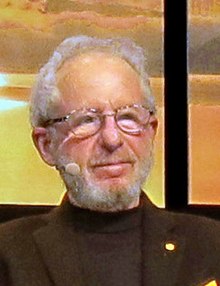Alan Jay Heeger (born January 22, 1936) is an American physicist and academic. He won the 2000 Nobel Prize in Chemistry. He won the prize with Alan G. MacDiarmid and Hideki Shirakawa "for their discovery and development of conductive polymers".[1][2]
Alan J. Heeger | |
|---|---|
 Heeger in 2013 | |
| Born | Alan Jay Heeger January 22, 1936 Sioux City, Iowa, United States |
| Nationality | American |
| Alma mater | University of Nebraska University of California, Berkeley |
| Spouse | Ruth (2 children) |
| Awards | Nobel Prize in Chemistry (2000) Balzan Prize ENI award Oliver E. Buckley Condensed Matter Prize (1983) |
| Scientific career | |
| Fields | Physics, Chemistry |
| Institutions | University of Pennsylvania University of California, Santa Barbara |
| Doctoral advisor | Alan Portis |
Heeger was born in Sioux City, Iowa, to a Jewish family. He grew up in Akron, Iowa.[3]
References
change- ↑ Shirakawa, Hideki; Louis, Edwin J.; MacDiarmid, Alan G.; Chiang, Chwan K.; Heeger, Alan J. (1977). "Synthesis of electrically conducting organic polymers: Halogen derivatives of polyacetylene, (CH) x". Journal of the Chemical Society, Chemical Communications (16): 578. doi:10.1039/C39770000578. Archived from the original on 2017-09-25. Retrieved 2021-01-14.
- ↑ "The Nobel Prize in Chemistry 2000: Alan Heeger, Alan G. MacDiarmid, Hideki Shirakawa".
- ↑ "Alan Heeger - Biographical". Nobel Foundation. Retrieved 3 April 2015.